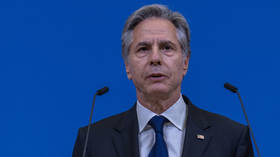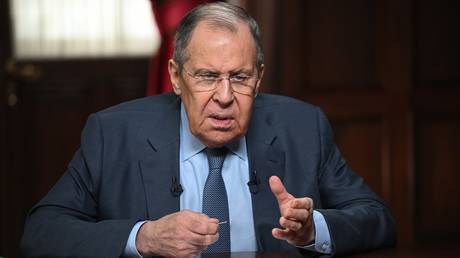‘Ukraine opposition’s right-wing agenda ignored by Western media’

RT: We just heard Sashko Bilyi saying, “as long as I live I will fight against Jews, communists, Russian scum.” He is an activist from Right Sector – an organization that will be incorporated with the police, according to one of the opposition leaders. As a former police officer, do you think that is someone you’d want joining the ranks of law enforcement?
Charles Shoebridge: I think your question is rhetorical, because it’s really clear that these kind of people are advocating the street violence. Even yesterday, deep inside one BBC broadcast, was an activist being interviewed who said that they didn’t want Yanukovich to be tried or anything like this. They just wanted him killed. This seemed to come as some shock to the media. It’s notable to point out that for weeks, the media in the West – certainly in the UK and US – has backed unreservedly these protests that have been taking place.
It’s really only in the last 24 hours or so that as the situation in Ukraine has predictably started to unravel, that the media here – and even government figures – have started to question the makeup of at least some of these protesters, including the fact that – as we’ve seen on our own television screens, unavoidably, over the last 48 hours and longer – many of them are heavily armed. It’s also clear that, as we can see from the rapid scale of what might be called defections amongst police, the neutrality of the armed services in this – or their reluctance to intervene in what is, after all, a public order/security situation in Ukraine – can be seen almost as a mutiny. It may well be that there has been activism, perhaps from the far right, because it’s notable that Svoboda, the far-right party, is quite well represented on the streets. It also was a party to disagreements on February 21 to chart a political way forward for Ukraine. So at least nominally, Svoboda had signed up to this agreement. And yet it’s also clear that there may have been some form of negotiations – some form of activism – going on behind the scenes, with links of various political groups to the armed forces, and perhaps even within the police itself. Certainly in the west of Ukraine that wouldn’t be a surprise.
RT: Why do you think mainstream opposition leaders haven’t been able to rein in the more extremist factions that are out on the streets?
CS: Simply because they are not aligned politically and never have been. I think it’s fair to say that at certain points, the majority of the demonstrators – certainly at an early stage – were representing a very wide spectrum of society, and one must remember what the protests were about. These protests were not as they have been billed in the West about democracy; these protests were initially about Ukraine deciding not (at least in the near future) to have a trade association with the EU. They were then protests about corruption – and there are, of course, issues of corruption within Ukraine, as there are in many countries. And then there was upset about the degree to which the 2004 constitution has been subverted. All of these were – and are –issues widely shared among Ukrainians. Particularly those of a western, more pro-European allegiance.
But at the same time, there has been a very hard core of these protesters – and these have been visible on our screens, despite what the commentary’s been saying – people who actually for right or wrong reject a democratic agenda. Also, it should be remembered that much of the right-wing is quite well represented in Ukraine, even within the democratic process. So it’s not clear at all that the people who have rejected – after all the four main political parties democratically elected within Ukraine in the last parliamentary elections – all of these four parties were represented in the agreement of yesterday, charting a political roadmap forward for Ukraine, including Yanukovich. But that has now been rejected by those on the streets. And of course those on the streets are now largely being supported by the army and the police. And of course, that brings into question the terminology that should be applied here: is this a coup, is this a revolution? Certainly it doesn’t appear democratic at this stage.



